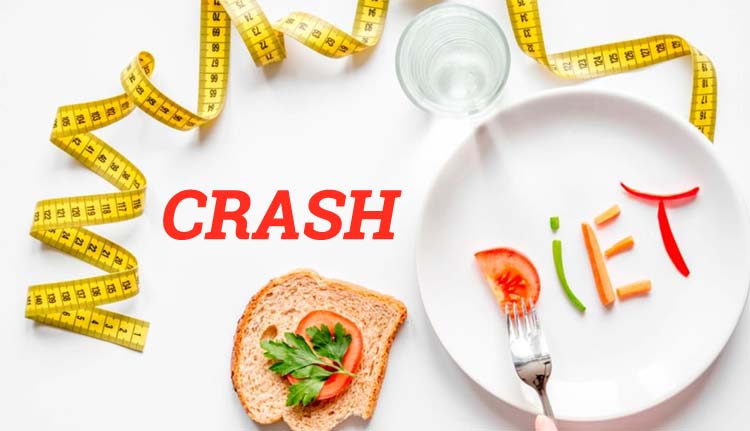When we talk about to weight loss, slow and steady is the best method to use for weight reduction. However, this is neither as exciting nor as easy. May be it seems more easier and sometimes more exciting to make a rapid change, especially when it is only for limited time period – but this is temporary.
The slow and steady approach is about changing habits for the long term by making minor change to your diet and lifestyle. Firstly it may seem more difficult, and it also required patience but it may result in long-term weight loss as well as a healthier lifestyle is to be maintained.
What is Crash Diet?
Crash diet is the diet used for rapid weight loss by taking extremely low-calories for a short period of time usually a few days to a few weeks. These diets usually involve severe calorie reduction, limited food choices, and extreme dietary changes. The main function of crash diet is to shed pounds quickly. While they may seem tempting, crash diets come with significant risks and drawbacks that can outweigh their short-term benefits.
Crash diets are generally not recommended and are considered unsafe for several important reasons
Purpose of crash diet
Crash diet is not recommended because of its possible risks and lack of long-term durability, but some people considered it for certain reasons. It is important that people should be aware of these reasons and the risks associated with Crash diet. Here are some reasons people may choose to do crash diets:
Quick Weight Loss
The primary allure of crash diets is their promise of rapid weight loss. Some individuals have specific short-term goals, such as fitting into a special outfit or preparing for a specific event, and they may turn to crash diets for quick results.
Motivation Boost
Seeing quick initial results on the scale can provide motivation to continue on a weight loss journey. For some, a crash diet’s quick results can kick start their commitment to healthier eating and exercise habits.
Peer or Social Pressure
Social or peer pressure to lose weight quickly for an event or due to societal expectations may lead some individuals to consider crash diets as a short-term solution.
Lack of Awareness
Some people have not much awareness about the risk factors associated with crash diet and they thought that crash diet is a viable and safe option for weight loss.
Types of Crash Diet
Crash diet is of many types, each type sets its own rules and principles. These types are defined by high calories restriction and are set for short-term goals. Here are some common types of crash diets:
The Cabbage Soup Diet
This diet involves consuming large quantities of cabbage soup along with specific foods for seven days. It is exceptionally low in calories and lacks essential nutrients, making it unsustainable and potentially unhealthy.
The Lemonade Diet (Master Cleanse)
This diet requires individuals to consume a special lemonade mixture made with lemon juice, maple syrup, cayenne pepper, and water for several days. Solid food is entirely eliminated during this time.
The Grapefruit Diet
In grapefruit diet it is recommended to drink grapefruit juice or to eat grapefruit in every meal. It is a low caloric diet that claims to increase fat burning.
The Military Diet
This three-day diet plan involves strict calorie restrictions on certain days, followed by normal eating on others. It claims to help individuals lose up to 10 pounds in a week.
The Egg Diet
The egg diet centers on consuming primarily eggs for a specific period. It is low in carbohydrates and may lead to nutrient deficiencies.
The Water Fasting Diet
Water fasting involves consuming only water for an extended period, ranging from a day to several days. This type of fasting can be extremely challenging and potentially dangerous without medical supervision.
The Juice Cleanse
Juice cleanses involve consuming only freshly pressed fruit and vegetable juices for a designated period. They are low in calories and may lack essential nutrients.
Are crash diets bad?
Crash dieting creates an unhealthy cycle where one can continuously working for immediate weight loss followed by gaining it back and then falling back into losing weight again. Unfortunately, this is what crash dieting often results in and it can be physically and psychologically dangerous.
Side Effects of Crash Diet

Crash diets, can have several side effects on physical and mental health. These side effects depend on person to person health condition, but they commonly include:
Nutrient Deficiencies
Crash diets are deficient in vitamins, minerals, and other nutrients. Prolonged deficiencies results in anemia, weakened immune function, and bone health issues.
Muscle Loss
Rapid weight reduction on a crash diet frequently results in the loss of lean muscle mass as well as fat. As a result, muscular weakening, decreased physical strength, and a less toned look may occur.
Metabolic Slowdown
In case of excess caloric reduction the body’s metabolism becomes slow down as it try to conserve energy. This can make it more challenging to maintain or lose weight in the long term.
Fatigue and Weakness
Crash diet reduces the body’s energy and nutrients which in turn leads to fatigue, weakness, and dizziness.
Irritability and Mood Changes
Due to sever caloric restriction, anxiety, irritability and depression occurs that affect mood changes.
Digestive Issues
Rapid caloric restriction in diet can cause digestive problems such as constipation, diarrhea, and indigestion.
Hair and Skin Problems
Crash dieting is nutrient deficient diet that can cause hair loss, brittle nails, and skin issues, including dryness and breakouts.
Weakened Immune System
A lack of nutrients from crash dieting can weaken the immune system, making individuals more susceptible to illnesses and infections.
Rebound Weight Gain
Once normal eating patterns are resumed after a crash diet, individuals often experience rebound weight gain. This results in to repeat a cycle of r crash dieting, which is harmful to overall health.
Long-Term Health Risks
Continuously adopting crash diets may increase the risk of developing long-term health issues like heart disease, kidney problems, and gallstones.
Conclusion
Crash diets are generally not recommended because they are not a safe or effective way to achieve sustainable weight loss and overall health. Instead, it’s advisable to focus on balanced, long-term dietary changes and lifestyle modifications that promote a healthy relationship with food and support gradual, sustainable weight management.

